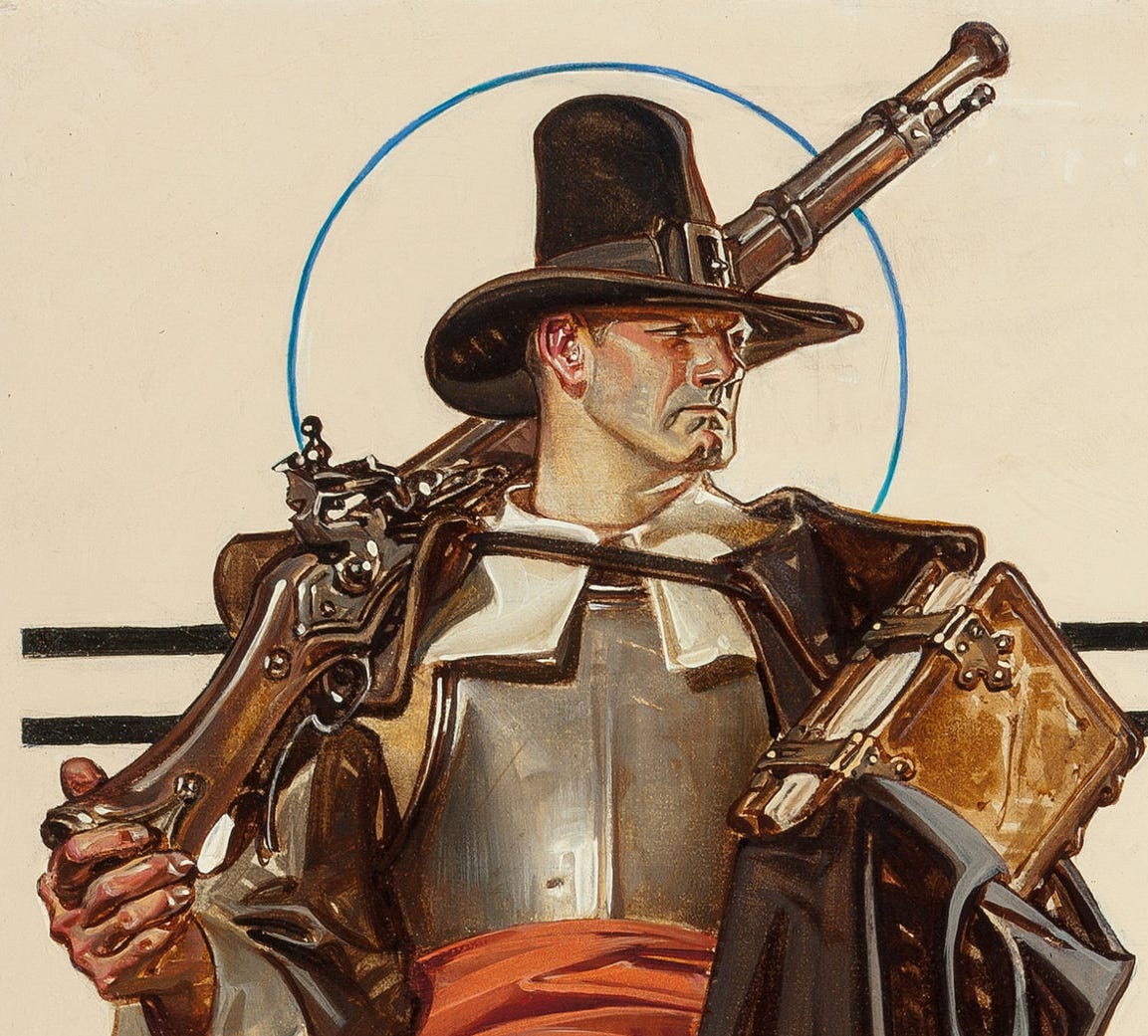Pilgrim's Egress
Under the 1559 Act of Uniformity, English subjects were fined one shilling – something like $25 today – for each Sunday service of the Church of England at which they failed to appear. Conducting unauthorized services could lead to much larger fines, imprisonment, even execution.
EXIT is a fraternity dedicated to shorting managerial systems and building the human institutions that come next. Learn more here:
As dissident English ministers and laymen were “found out” for preaching controversial sermons, missing one too many meetings, etc., they began seeking each other out. Some gathered in secret; some tried to maintain communion with the Church of England; others openly defied its authority, and suffered the consequences.
One such congregation, in a little Yorkshire village called Scrooby, had come together only a year or two before the persecution grew so intense that they fled across the English Channel to Leiden in the Netherlands, with little more than the clothes on their backs. (They had to attempt this twice; the first captain they hired in 1607 betrayed them to the authorities, and they were imprisoned for a month, with all their property confiscated.)
In Leiden they were free from religious persecution, but impoverished.
They lived in a neighborhood called “Stink Alley” (seriously) and scraped a living through grueling unskilled industrial labor – so that in 1617, leader William Bradford remarked that the congregation was prematurely aging and worried that they would soon “scatter … or sink under their burdens”. Worse, their children were beginning to assimilate to the urban liberal customs of the city.
In 1620, in exchange for the ship Mayflower and enough provisions to cross the Atlantic, the Pilgrims sold an equity stake in their New Jerusalem to the Merchant Adventurers of London and agreed to bring along a large group of secular settlers, promising to send back fur, timber, and fish to repay their investors.
The Pilgrims were aware that the English colony at Jamestown had been nearly wiped out by starvation and disease ten years earlier, and they had heard (accurate) stories of bloodthirsty natives – but Bradford commended their fates to God, reasoning that they could not stay in Leiden or return to England. They would have to travel to the New World, or become extinct.
Mayflower’s caulking failed early on, so the passengers were soaked through day and night for the 10-week voyage, overcrowded and violently seasick. The Pilgrims didn’t find a suitable settlement until December 7th, by which time the ground was frozen and planting was impossible. Their scouting party slept ashore in sub-zero temperatures, with wet shoes and stockings that froze to their feet. The rest of the party stayed on board Mayflower all winter and were slowly decimated by scurvy, pneumonia, and tuberculosis.
Over the winter, the Pilgrim scouts discovered an Indian cache of corn and beans buried underground, which the 53 survivors used for the spring planting – and the celebration of that harvest, in the autumn of 1621, was the first Thanksgiving.
Many of our people talk as if the problems we face are uniquely wicked and intractable — the good times are over, the frontier is closed (like our ancestors just had to show up here and claim their free land) — but none of the poverty and persecution and worldly compromises that we have to contemplate seem like they would have intimidated our ancestors. They made it, and we’re gonna make it too. At least, like, half of us.
Guys in our sphere often view Exit as a cowardly or futile gesture.
You can’t just run off into the woods, they say; the enemy will follow you wherever you go. That’s perfectly true now, and it was true for the Pilgrims. They never escaped (and never intended to escape) the authority of the Crown. They lived and died as English subjects. But they won the kind of sovereignty that ordinary people care about: a space where they could live the way they wanted to live, because no one had the power or the will to stop them.
Much has been made of the “hypocrisy” of the Pilgrims fleeing religious persecution in England, only to create a harsh and demanding theocratic state of their own in Massachusetts. All I can say is, if my people had gone through all that noise to make something of our own, I would be extremely comfortable telling newcomers to familiarize themselves with the code of conduct.
Some of you may be looking for an EXIT just for yourself, or your immediate family; I want to know and trust everybody around me for ten square miles. I want the liberty that comes when everyone knows what is expected, and we handle things in-house. The freedom I want isn’t the absence of rules – it’s me and the boys making the rules.
Regardless of what the law promises, you are not free when your employment, your children’s education, your healthcare, the value of your savings, your food supply, etc. are all bestowed at the mercy of people who despise you.
We are reclaiming our liberties by making them harder for our enemies to touch. Join us.







"But Pilgrim Gigachad! Imagine if the roles were reversed!"
- "We're in the New World, brother. I don't have to imagine any more."